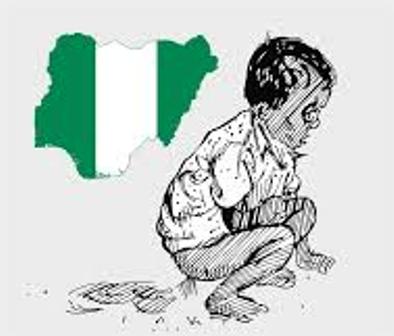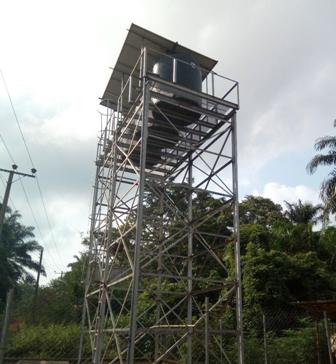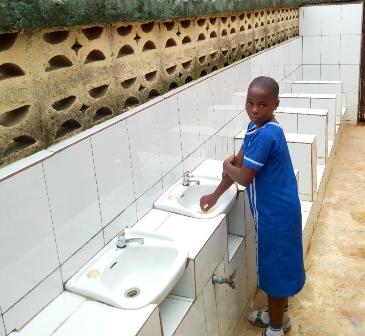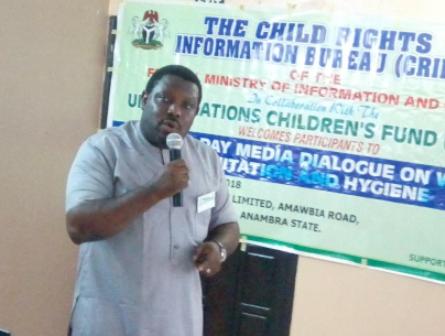
According to statiscts from UNICEF, No fewer than 46 million Nigerians practice open defecation, ranking the country as third globally among countries with such practices. Also, it is reported that 130 million people in the country use unimproved sanitation. Expectedly, Nigeria is also one of the countries with high burden of neglected tropical diseases (NTDs) which are closely linked with open defecation and poor sanitation. NHO’s MARCUS FATUNMOLE who participated in a two-day Media Dialogue, organized recently by the Federal Ministry of Information and Culture in collaboration with UNICEF, on the state of WASH in the country however reports that the country, with the support of agencies such as UNICEF and WHO, is making strenuous efforts to reverse the trend.
Do you know you could be passing a death sentence on fellow human beings if you build a house without a toilet?
Are you aware that each time you defecate in the open, you provide breeding ground for bacteria, worms and viruses that will cause infections which could result in lifetime ailments and death for others?
Do you know that each time you fail to wash your hands after using the toilet, keep your environment clean and even drink safe water, you not only cause harm to yourself alone but to people around you?
Do you know that poor hygiene is responsible for most of the diseases and deaths recorded in low-income country?
Also, are you aware that while Neglected Tropical Diseases (NTDs) have not attracted needed interest in countries where they have been rampant like Nigeria, they have strong link with unsafe water, poor sanitation and hygiene? The story of Ayodele Adelaja (not real name) should be of interest to you.
Adelaja spoke to our correspondent recently in Abuja about his life in a rural community where open defecation is practised and how he ended up with oncocerciasis (also known as River Blindnesss), a parasitic disease and one of the world’s neglected tropical diseases. His story:
“I grew up in a village in Akure North Local Government Area of Ondo State. All through my primary and Junior Secondary School days, I never lived in any house with toilet. Most people in my town defecating in nearby bushes.
“I could count the number of houses that had any form of toilet at that time. Even at midnight and in the rain, we went to the bush to defecate.
“Apart from our own wastes, there were domestic animals all over the streets. Dogs, goats, pigs, fowls, sheep and ducks were raised by families at the time. They moved freely about till they return to their homes in the night. I could remember how we children always swept the open spaces at the front and back of our houses every morning before we went to school. There were always heaps of animal dungs and sometimes human faeces.
“Pigs and dogs could bring some of those faeces around the house from the bush where we had passed our wastes. Things got very bad in the dry season when offensive odour oozes out from nearby bushes. Our homes were usually filled with stench from the bush. These were the same places where we prepared and ate our foods.
“More unfortunately for us, we never had any source of potable water. Our water supply was always from dams and other unsafe sources. That was the trend until I left the village in 1996 after I finished my senior secondary school.
“Until I got to senior secondary school and began to use pit toilet, I never knew the unpleasant smell from the bush had any bad effect on human health. For us then, it was just a way of life. One thing I knew then was that I was always falling sick, sometimes down with typhoid, sometimes vomiting among others. There were only a few health facilities at the time, and my poor parents didn’t find it easy paying the medical bills.
“As children, we were very adventurous. After school hours, we used to go to the river to swim. It was usually delightful experiences at the time. But, I never knew it could be a path to contracting infection, pains and death.”
Today, Adelaja and another member of his family are receiving treatment for onchocerciasis, a neglected tropical parasitic disease transmitted through repeated bites of infected blackflies (the Simulium spp).
Neglected Tropical Parasitic Diseases (NTDs) such as soil-transmitted helminthiases, onchocerciasis , filariasis, drancuculiasis, trypanosomiasis, lymphatic filariasis and related ailments have link with water, sanitation and hygiene and available records at foremost health institutions such as the World Health Organization show they are common in rural communities.
Experts believe virus and bacteria breed freely where there is poor attitude to hygiene. For instance, it has been proven that only one gramme of faeces can contain up to 10 million viruses.
Nigeria, which battles no less than 13 NTDs, ranks among nations with poor water, sanitation and hygiene worldwide.
According to the 2015 Joint Monitoring Programme (JMP) of the World Health Organization and UNICEF, of estimated 180 million Nigerian population, 46 million practice open defecation, while 130 million use an unimproved sanitation facility, with more than half living in rural areas.
45,000 children under five die annually in the country from diseases caused by poor access to water, sanitation and hygiene (UN-GLAAS, 2014)
Nigeria ranks among top three countries in the world with largest number of people practising open defecation (WHO/UNICEF JMP 2015)
Poor hygiene causes other diseases like cholera and diarrhoea. Diarrhoea alone kills 2,195 children every day globally—more than AIDS, malaria, and measles combined, according to the Lancet.
Diarrheal diseases account for one in nine child deaths worldwide, making it the second leading cause of death among children under the age of five. For children with HIV, diarrhea is even more deadly; the death rate for these children is 11 times higher than the rate for children without HIV.
The World Health Organization (WHO) estimates that 842,000 deaths from diarrheal diseases each year could be prevented by improved WASH.
About 88% of diarrhoea-associated deaths worldwide are attributable to unsafe water, inadequate sanitation, and insufficient hygiene, according to WHO.
Statistics above was part of a presentation by Mainga Banda, UNICEF WASH Specialist in Awka, Anambra state, at a two-day Media Dialogue on Water, Sanitation and Hygiene recently. The dialogue was organized by the Federal Ministry of Information and Culture in collaboration with UNICEF to enligthen participants on state of WASH in the country, and also conduct them round WASH facilities executed by EU and UNICEF in the state with support of the state government.

In order to reduce the burden of challenges association with WASH in the country, EU and UNICEF partnered and implemented phase two of Water Supply and Sanitation Sector Reform Programme (WSSSRP) Six benefitting states are Anambra, Yobe, Osun, Kano, Cross River and Jigawa.
Overall goals of the programme are to increase access to safe, adequate and sustainable WASH services delivery in the focus states.
The targets include increasing access to safe and sustainable water supply services for 1.5 million underserved people with equity in the rural communities of 20 self-selected LGAs in the six EU focal states; increasing access to improved sanitation and hygiene promotion in rural communities, schools and health facilities; and establishing a state-level monitoring and evaluation (M&E) that is integrated with the federal level M&E system.
While Anambra remains one of the few states in the country not threatened by NTDs, there are many states that burden the nation with the conditions.
NTDS are in different categories. Taenaiasis and cysticercosis are parasitic diseases. Taeniasis is a mild disease caused by the presence of the adult tapeworm in the human intestine. It is a severe disease that results when humans ingest the tapeworm’s eggs which develop as larvae (cysticerci) in their tissues. Cysticerci may develop in muscles, skin, the eyes and the central nervous system. Neurocysticercosis, the most severe form of the disease, results when the central nervous system is invaded; it is a major cause of epilepsy.
Soil-transmitted helminthiases, or intestinal worm infections, are transmitted to humans through soil contaminated by human faeces, mostly in areas where sanitation is poor. Infection leads to anaemia, vitamin A deficiency, stunted growth, malnutrition, intestinal obstruction and impaired development.
Unlike the Millennium Development Goals (MDGs) WASH has a dedicated goal within Sustainable Development Goals (SDG) Six. Target 6.1 of the SDGs seeks to achieve universal and equitable access to safe and affordable drinking water for all by 2030. Target 6.2 intends to achieve access to adequate and equitable sanitation and hygiene for all and end open defecation, pay special attention to the needs of women and girls and those in vulnerable situations by 2030.
WASH helps reduce maternal disease and death; child disease and death; under-nutrition and stunting. It protects from violence; increases dignity; school attendance, especially for girls.

NTDs transmission routes can be interrupted with improved WASH. Though, there is still a great need for operational research on the feasibility and effectiveness of pairing specific WASH interventions with specific NTDs, as endorsed by the WHO roadmap for NTDs, access to safe WASH services are key to prevention, intensified control, management and elimination of NTDs.
Banda noted that through the current programme, 2527 WASHCOMs have been formed and trained and are managing water supply facilities and keep acceptable operation and maintenance records.
She said more than 945,000 additional people in the rural communities of six EU focal states have access to safe water supply; more than 2,500,000 additional people in the rural communities of six EU focal states have access to sanitation and hygiene, while more than 1625 communities have achieved open defecation free (ODF) status. 39,925 school pupils in about 234 schools have access to safe water supply and basic sanitation facilities.
Programme Manager, Rurual Water Supply and Sanitation Agency, Ministry of Public Utilities and Water Resources in Anambra state, Ezekwo Victor, said the state government had committed much funding into WASH projects in the state.

According to him, the state is a leading contributor of counterpart funding for WASH programmes in the country.
He listed some of the challenges of WASH in the state to include inability of community to raise fund for operation and maintenance and difficult geological environment making it difficult to get underground water without digging to about 400 metres.
The media team was led to Amuekwe and Anuli communities, Ezenifite, Aguata Local Government Area of the state to inspect water and sanitation projects executed for people of the communities by EU, UNICEF and the state government.
Meanwhile, Director, NTDs Department, Federal Ministry of Health, Dr Chukwuma Anyaike, shed more light into the interconnection between WASH and NTDs in an interview with our correspondent. He said: “Most of the Neglected Tropical Diseases, especially the soil-transmitted infections have to do with round worms, lukewarm and all that. These are the things we can get from open defecation, contamination of food, contamination of drinks and water. Food in terms of when people take the faeces to do manure, they can get it. When there is rainfall and it flushes the product of that defecation into water-logged area and, people can get it.
“Most importantly, people get it from water. That is why water is very important, especially in the villages. That is why NTDs is mostly prevalent in the villages, because those ones are in rural areas. There is no borehole, there is no water board. The villagers will fetch any water they see (including the contaminated water) and drink.
“There is another one called schistosomiasis. When the stream is contaminated, children go into that stream and swim. Most of them drink the water and get infected. When children get it, they have protruded abdomen. They have a lot of worms. They don’t grow very well. If you see them, you think they are pregnant. They are the ones that can urinate blood.
“Most importantly, for this WASH, what is WASH all about? Wash your hands, drink potable water, and ensure good hygiene. That is what WASH is all about. If you go to toilet, you make sure you wash your hands, before you eat food, wash your hands. The beauty part of it is that as you are washing your hands, you are protecting others. You shake hands with other people. Your hands may carry a lot of worms if not washed. You eat with dirty hands and share food with people.
“This thing affects children’s growth, it affects their education, it affects their development. It affects everything about children. In the children at the early stage, everything that affects their mental development affects them. When they come to school, they are not concentrating. They may be vomiting the food you give them, and they may not sleep very well.
“When a person is malnourished, the IQ is weak. That is why we put so much pressure on children. At that stage, their mental development is very important,” he stated.
He said government had been advocating periodical deworming of children. Besides, he said government should carry out deworming of children with its school feeding programmes. He said if a child has worms and the child is fed a thousand times a day, it is the worms that are being fed and not the child.
Dr Anyaike furthered that not only children are affected by contamination of soil-transmitted infections, but adults, especially pregnant mothers.

